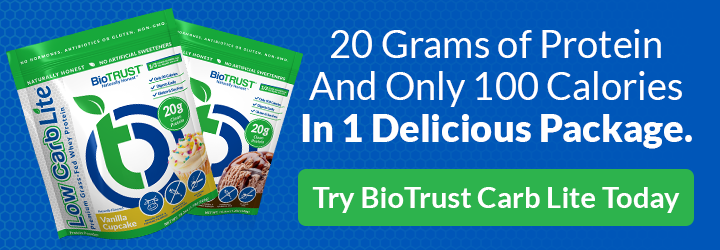Is Whey Protein Good for Weight Loss? See the Facts

Protein is as essential as it gets when it comes to building and maintaining a healthy diet and body. Yet, with a surplus of protein options, picking a protein source can be difficult, especially when trying to lose weight.
In addition to the most obvious proteins, such as beef, chicken, fish, and pork, protein supplements are a quick and convenient option. However, like traditional protein sources, there are numerous choices when picking a protein supplement. And, one of the most widely used and popular protein supplements is whey protein. But is whey protein good for weight loss?
The Importance of Protein
Protein is considered one of the body’s most essential nutrients because it’s valuable to every cell in the body. It’s required for maintaining our bones, muscles, organs, skin, and nails and even helps keep the systems of the body running properly.
Still, protein is most well-known for being a key component in sustained weight loss. This is because research has shown that consuming diets higher in protein is not only safe for otherwise healthy individuals, but these diets may provide a host of health benefits, including helping boost metabolic rate and energy expenditure, increase satiety, and reduce caloric intake, as well as preserve and build calorie-burning lean muscle.
How Much Protein Do I Need a Day?
The Dietary Reference Intake or RDI of protein for a healthy adult is around 0.36 grams per pound of body weight. This is about 56 grams per day for the average sedentary man and 46 grams per day for the average sedentary woman. 1 However, higher protein diets have been shown to improve health and metabolic function as well as help folks maintain a healthier body weight with less fat and more muscle. For people who want to consume a high-protein diet who exercise regularly, it is recommended that protein intake be increased to at least 0.73 grams per pound of body weight.
Unfortunately, achieving the optimal amount of protein in the diet can be challenging, which is why so many of us turn to protein supplementation. Yet, when it comes to optimizing protein intake and reaping the benefits of protein, protein quality is critical. This is a major component as to why whey protein comes out on top and is an excellent choice when it comes to weight loss.
Why Protein Quality MATTERS
The term protein quality refers to the balance of amino acids, the digestibility of the protein, and the availability of the absorbed amino acids. In particular, protein quality emphasizes the essential amino acids, which are those the body needs, cannot produce, and must get through the diet. For these reasons, whey protein, along with other animal-based proteins, reign supreme across the scales for protein quality. They’re easily digested, rapidly absorbed, and the most concentrated sources of essential amino acids.
If we take an even closer look, the two major components of milk protein are whey, which is rapidly digested, and casein, which is digested much more slowly.
Whey makes up 20% of the proteins in milk and is the liquid portion of milk. It is separated from the curd, which comprises the remaining 80% during the cheese-making process. Whey contains five major peptides and hundreds of low-abundance peptides, which together provide a host of benefits for weight loss.
Benefits of Whey Protein for Weight Loss
1. Weight Management
In general, high-protein diets promote healthy weight management, and compared to normal-protein diets, they tend to accelerate fat loss, help maintain calorie-burning lean muscle mass, and prevent weight regain. In a recent study, researchers concluded that the current body of literature supports the use of whey protein, either as a supplement combined with resistance exercise or as part of a weight-loss or weight-maintenance diet, to improve body composition. 2
Along those same lines, supplementing with whey protein may help accelerate fat loss and build/maintain calorie-burning lean muscle. And those effects may be even better when combined with regular strength training. In other words, whey can be quite useful to enhance quality weight loss and support long-term weight maintenance.
2. Appetite Control
Consumption of whey protein can also have a powerful effect on appetite, which can help control cravings and food intake. While it’s commonly known that protein increases satiety, some research suggests whey may have specific advantages. For instance, whey protein has been shown to decrease hunger to a greater extent than other protein sources, such as soy, tuna, turkey, and eggs. Whey consumption can also lead to an increase in hormones like GLP-1, GIP, and CCK, which suppress appetite and promote satiety, and a decrease in levels of the “hunger hormone” ghrelin. 3, 4
3. Boost & Preserve Metabolic Rate
When it comes to supporting a healthy metabolism, whey protein supports several metabolic functions. While all foods have a thermic effect, meaning a certain percentage of their usable calories are burned for metabolism and/or storage, the thermic effect for protein is over five times higher than that for carbs or fats.
In other words, you burn more calories when you consume whey protein and other high-protein foods. It also means that protein-rich foods like whey provide less metabolizable energy, meaning your body is less likely to store calories from protein as fat. 5
Additionally, diets including plenty of high-quality protein like whey are essential for building and maintaining muscle mass. And as most people know, muscle is metabolically active and burns calories. In fact, a pound of skeletal muscle burns about three times more calories than a pound of fat.
4. Muscle Growth, Recovery and Strength
Two primary factors governing muscle recovery and growth are muscle protein synthesis or the rate the body rebuilds muscle, and muscle protein breakdown. Whey protein is an abundant source of essential amino acids and is rapidly digested, making it an excellent protein source for increasing muscle protein synthesis and regulating muscle mass.
With these key characteristics in mind, it’s no wonder why whey protein is a first-class option for weight loss as well as improving body composition. Nonetheless, whey protein processes a surplus of health-aiding benefits beyond just weight loss.
But buyer beware, not all whey protein is created equal. When selecting a whey protein to incorporate into your diet, it is essential to choose a premium whey protein, like BioTrust Low-Carb whey protein powder. BioTRUST whey protein powders are not only made with the best-in-class grass-fed protein from pasture-raised cows, but they also include the patented, research-backed digestive enzyme blend ProHydrolase®.
According to research, ProHydrolase is more than twice as effective at delivering protein to your body than any other enzymes used in other protein products, making BioTRUST whey protein an easy choice when striving to achieve your health, diet, and weight-loss goals. 6







